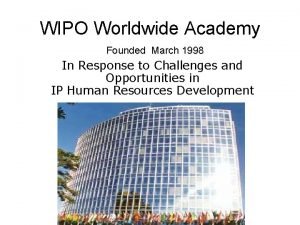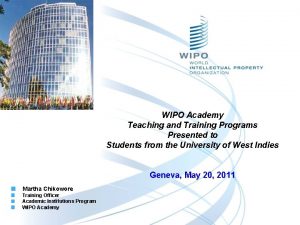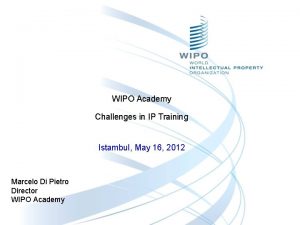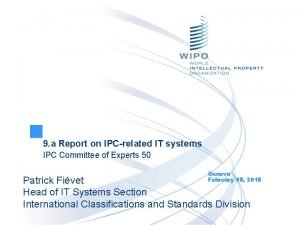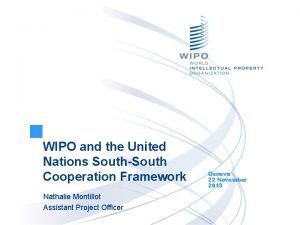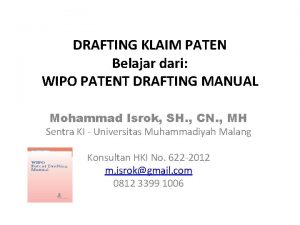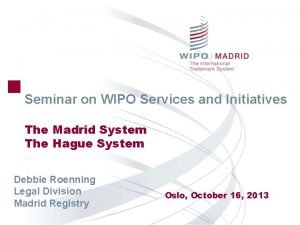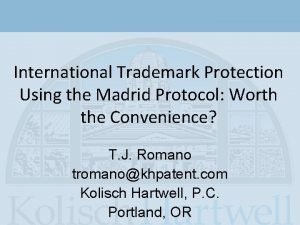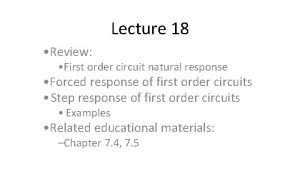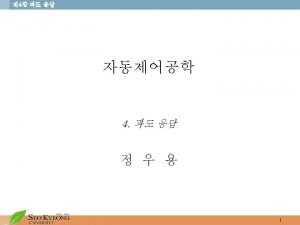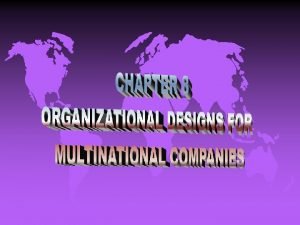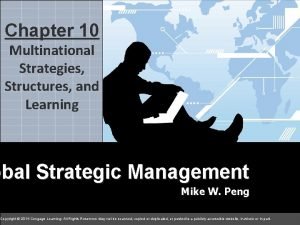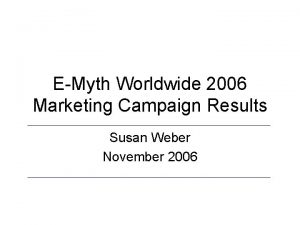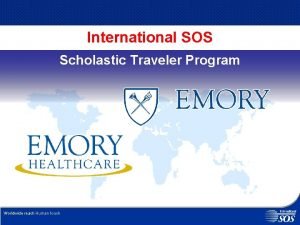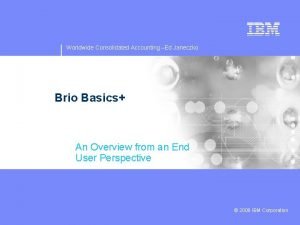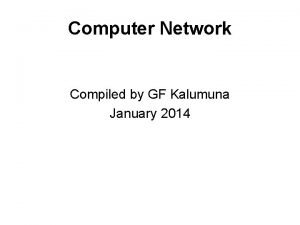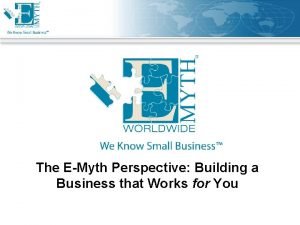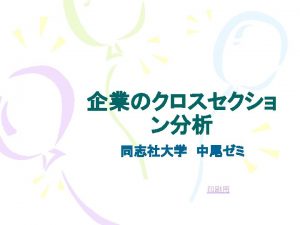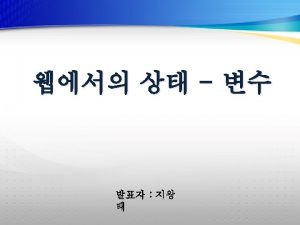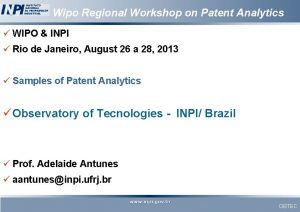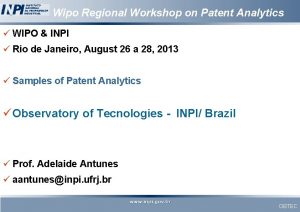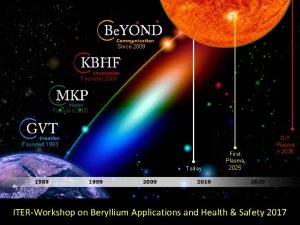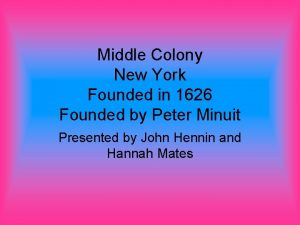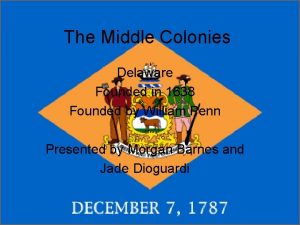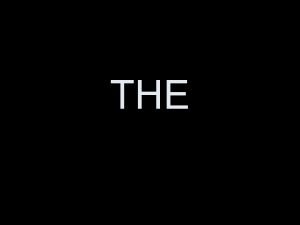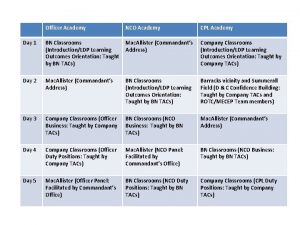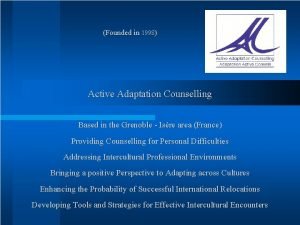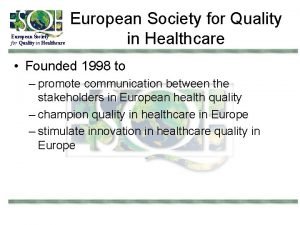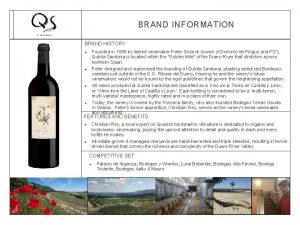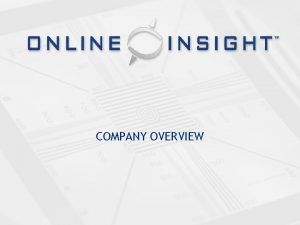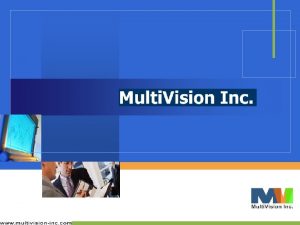WIPO Worldwide Academy Founded March 1998 In Response





























- Slides: 29

WIPO Worldwide Academy Founded March 1998 In Response to Challenges and Opportunities in IP Human Resources Development

Challenges • Post TRIPS: IP interdisciplinary subject; But lack of specialized human resources viz: – IP offices - technical staff, lawyers, collective management societies – Universities, technical institutions, high schools – Policy makers and advisers in government

Challenges – Law enforcement - judges, police, customs officers – Professional associations including Chambers of Commerce – Private enterprises specifically SMEs – IP Asset management specialists – R & D institutions - scientists, engineers, biotechnologists, etc. , to draft patent specifications and conduct patent search

Challenges – Taxation experts with IP knowledge – Inventors associations • Need to create awareness of IP as a tool for national development, innovation and wealth creation (private and public) • Need to create general awareness of intellectual property and its implication on other disciplines outside law

WIPO WORLDWIDE ACADEMY

WIPO Academy’s Programs

WIPO Academy Objectives Center of excellence in teaching, training, research in IP n Development of human resources in IP n. Forum for debate /exploration of IP policy n

Essential Factors to Development • “…three basic things right: … the right education programs and knowledge skills to empower more of their people to innovate…; and the right governance – that is, the right tax policies, the right investment and trade laws, the right support for research, the right intellectual property laws, and, most of all, the right inspirational leadership – to enhance and manage the flow with the flat world. ” * • “Four interconnected features of the modern market economy are of decisive importance, the corporation; innovation and growth; intellectual property; and the role and functioning of financial markets. […] Given the role of innovation, intellectual property is … the most important example of property that only a powerful state can protect”. ** *Thomas L. Friedman, The World is Flat (2006) **Martin Wolf, Why Globalization Works (2004)

National Strategy of Intellectual Property Business-friendly Environment Government Strategy/Policies Wealth, Value, Brand of Companies & Nation (protected by IP) Institution (IP Laws, IP Office) Cultivate “IP Conscious” Human Resources (Education to Creators, Innovators) !

WIPO Academy Distance Learning Program in Seven languages Всемирная Академия ВОИС ﺍﻟﻌﺎﻟﻤﻴﺔ ﺍﻟﻮﻳﺒﻮ ﺃﻜﺎﺩﻳﻤﻴﺔ La Academia Mundial de la OMPI A Academia Mundial da OMPI Académie mondiale de l’OMPI 世界知����� 世界学院

Background of WIPO DL • Within Use of ICTs (new era) • First generation: Web pages and home grown systems (WEB) 1993/94 • Second generation: Learning Management Systems (LMS) Standard Packages 1997/98) • Third generation: Managed Learning Environment (MLE) Integ. Solutions 2000/current (WIPO) • Fourth generation: Personal Learning Environment (PLE) Lifelong eportfolio & student controled, webcasting, blogging 2000/current • Fifth generation: Collaborative Working Envirnment (CWE) Webdesktop & applications «Web 2. 0 » multimedia authoring & video editing

Distance Learning Cost effective n Flexible n Large audiences n Cater to varying types of learning and languages:

Course Selection Academic Year 2007 DL 001 – Intellectual Property Primer (20, 000 students) DL 101 – General Course on Intellectual Property (50, 615) DL 201 – Advanced Course on Copyright and Related Rights DL 202 – Advanced Course on Electronic Commerce and Intellectual Property DL 203 – Advanced Course on Traditional Knowledge and Intellectual Property (60 - course under review) DL 204 – Advanced Course on Biotechnology and Intellectual Property DL 205 – Introduction to the UPOV System of Plant Variety Protection under the UPOV Convention

Course Selection Pilot Courses Academic Year 2007/9 DL-208 – Patent Drafting (June 2008) DL-209 – Patent Search (June 2008) DL-301 – Patents (June 2008) DL-302 – Arbitration and Dispute Settlement (June 2008) DL-303 – IP for Small and Medium Size Enterprises DL-304 – Technology Licensing DL-305 – Copyright Licensing DL-306 – Biotechnology Licensing

Fee per course • DL-001 – sponsored by WIPO • DL- 101 – sponsored by WIPO • Advanced Courses: - Administration fee – USD 80. 00 – USD 120 students & professionals -participants with whom WIPO has a Technical Cooperation – USD 250 -USD 400. 00 students & professionals -standard fee

What Research Says about Learning Goals and Styles (60 years) • 3 Types of learning approaches • Deep approach - Intention to understand – Motivated by intrinsic interest – Vigerous Interaction with content – Versatile learning-comprehensive and operational learning • Surface Approach- Intention to reproduce or memorize – – Motivated by extrinsic interest (tasks oriented) Failure to distinguish principles and examples Focus on elements without intigration to principles Time pressures • Strategic Approach- Intention to obtain highest possible grades – – Motivated by hope of success Highly organized Ensure materials for studying Use previous exam papers, alert to marking schemes

Learners at a Distance

The face of WIPO Academy DL Program

DL-101 (since 1999) • DL-101 • (in 7 languages) • General Course on Intellectual Property – Guide to studying the course – Introduction to Int. Property – Copyright – Related rights – Trademarks – Geographical Indication – Industrial Design – Patents – International Registration Systems – Unfair Competition – Protection of New Varieties of Plants – Discussion and Summary – Final Exam

DL-101 -Offering-Outsourcing-Licensing of Courses

Advanced Courses (DL 200 s) Head Tutors

DL Participants by category

Cooperation with Universities

Distance Learning Beneficiaries 2000 - 2007: 82, 677

Worldwide Coverage Without With Fellowships DL DL

Objective -Interdisciplinary Approach to Teaching IP Strategic use of IP requires interdisciplinary (multi-dimensions) knowledge and skills.

IP Teaching by WIPO Academy- Distance Learning Tutors • Persepctive on Teaching • Persepctive on knowledge • Instruction • Active engagment with information provided • Subjective, contextualized, relative, situated in action, fluid • Learner-centered

IP Teaching by WIPO Academy- Distance Learning Tutors • Role of the teacher • Goal: Guide, Facilitator • Role of the learner • Goal: Active participant, responsible for his/her own learning • Learning method • Goal: Interactive engagement • Goal: Standardized tests, self • Assessment assessment

Thank you
 Wipo dl-101 final exam questions
Wipo dl-101 final exam questions Wipo academy courses
Wipo academy courses Wipo academy courses
Wipo academy courses Poland national anthem lyrics
Poland national anthem lyrics Wipo gbd
Wipo gbd Global design database
Global design database Wipo
Wipo Wipo ipccat
Wipo ipccat Global brand database
Global brand database Buenos aires plan of action
Buenos aires plan of action Wipo patent drafting manual
Wipo patent drafting manual Madrid goods and services manager
Madrid goods and services manager Globalbrand database
Globalbrand database Romarin wipo
Romarin wipo What is natural response
What is natural response Natural and forced response
Natural and forced response Primary immune response and secondary immune response
Primary immune response and secondary immune response Organizational subunits
Organizational subunits Worldwide product division structure
Worldwide product division structure Worldwide international student exchange (wise)
Worldwide international student exchange (wise) Emyth worldwide
Emyth worldwide Coffee production worldwide
Coffee production worldwide Worldwide reach human touch
Worldwide reach human touch Worldwide
Worldwide Brainpop ocean currents
Brainpop ocean currents Are countrywide and worldwide networks
Are countrywide and worldwide networks Emyth worldwide
Emyth worldwide Worldwide one person in every experiences persistent hunger
Worldwide one person in every experiences persistent hunger Worldwide espacenet
Worldwide espacenet 5 voices summary
5 voices summary
